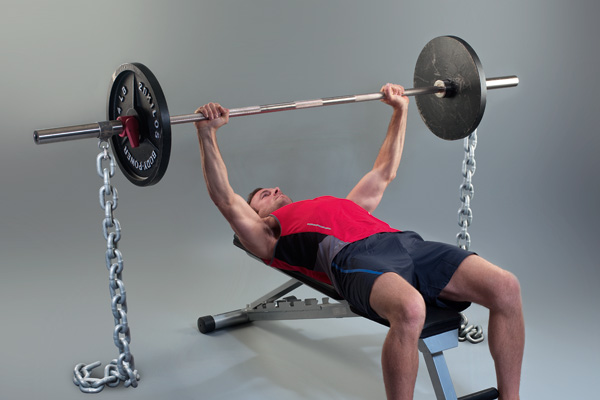Charles Poliquin's bench press tips
Try Charles Poliquin’s tweaks to the classic bench press for sustained muscle growth

Sign up for workout ideas, training advice, reviews of the latest gear and more.
You are now subscribed
Your newsletter sign-up was successful
The bench press is an invaluable exercise for developing strength and size in the chest, shoulders and arms. Because it uses so many muscle groups, it allows you to use a lot of weight – elite powerlifters have bench pressed over 320kg without assistive gear and 450kg with it.
In most gyms you’ll perform the standard bench press on a flat bench, but for maximum muscle size and strength you should do several variations of this exercise. First, let me make it clear what I consider the proper grip for a standard bench press: placing the hands so the index fingers are at biacromial width (the proper name for a shoulder-width grip). Wider or narrower grips are not worth considering because they place too much stress on the shoulders.
You’ll notice that there’s no place for Smith machine bench presses in my recommendations. These are also too stressful on your joints thanks to the restriction on how the bar moves, and neither do they work any of your small but important stabilising muscles. Besides this, numerous studies have found they don’t work the target muscles as thoroughly as barbell benching. The only thing I ever use a Smith machine for is for hanging up my jacket on the way to the weights.
Reverse-grip bench press
This variation is performed with a supinated grip (palms facing you). It is generally easier on the shoulder joints and increases the emphasis on the triceps. However, it can feel a bit awkward at first so start with a lighter weight than you’d usually expect to lift. You will also require a spotter to hand you the bar and help return it to the rack.
California press
This move is called something different every place I go, but the movement stays the same. It’s a hybrid move – a cross between a close-grip bench press and a lying triceps extension, so you lower the bar towards your Adam’s apple rather than over your nipples. It’s a great move to increase triceps mass, but again you may need to start with a lighter weight to get used to the new movement pattern.
Partial-range bench press
I don’t prescribe this often but it has its value, especially in powerlifting or in grappling sports such as judo, when you need to keep an opponent at arm’s length. Limiting the range of motion by using pins in a power rack allows to lift heavier where you
are strongest – at the top of the move.
Bench press with chains
Chains provide an even increase in resistance as the barbell is pressed off the chest, which enables the resistance curve to more closely match an individual’s strength curve. Chains are great for squats too and can help you smash a strength plateau. If your gym does not have chains, it’s time to change gyms.
Thick-bar bench press
Although thick bars are associated with pulling exercises, they can also be effective for increasing your pressing strength. Thick barbells are expensive, but you can get an equally effective workout by using fat-grip attachments, such as those at fatgripz.com. You will need to lower the weights you lift at first, but expect to get stronger quickly.
Get advice, find a course and buy supplements at charlespoliquin.com
For more expert training advice, subscribe to MF - we'll give you five issues for £5.
Download a digital version of the latest issue from iTunes.
Flat out
Change your position for these presses to get even more muscle-building benefits.
Shoulder press
Targets: shoulders, triceps
- Stand tall with a barbell resting across the front of your shoulders.
- Press directly overhead until your arms are straight.
Sign up for workout ideas, training advice, reviews of the latest gear and more.
Incline bench press
Targets: upper pecs, shoulders, triceps
- Lie flat on an incline bench holding a barbell with a shoulder-width grip.
- Press the bar directly up.
Decline bench press
Targets: lower pecs, shoulders, triceps
- Lie flat on a decline bench holding a barbell with a shoulder-width grip.
- Press the bar directly up.
One of the world's premier strength coaches, Charles Poliquin has successfully trained professional athletes and Olympians worldwide. Poliquin writes a monthly column for Men's Fitness about how to train as effectively as possible.

